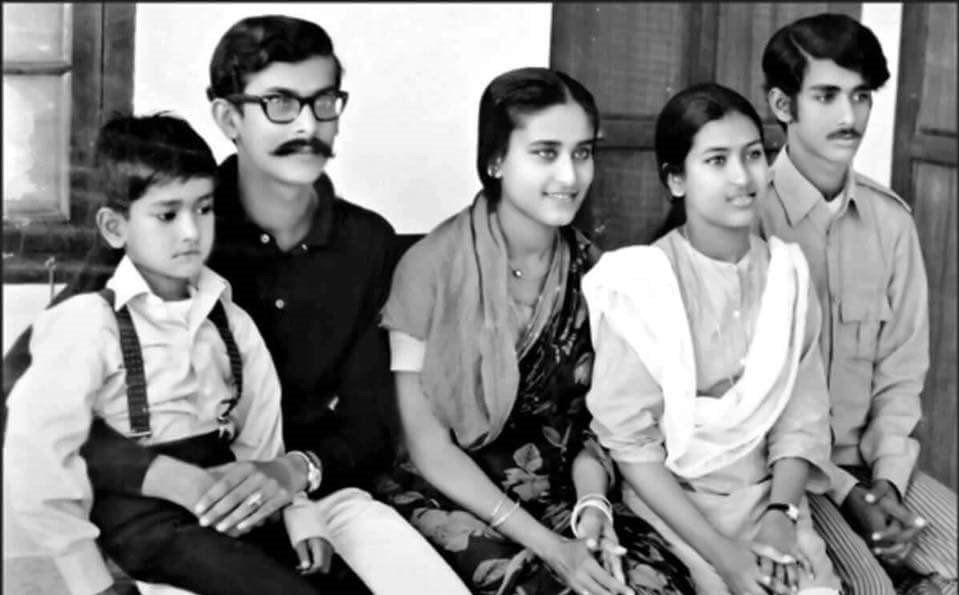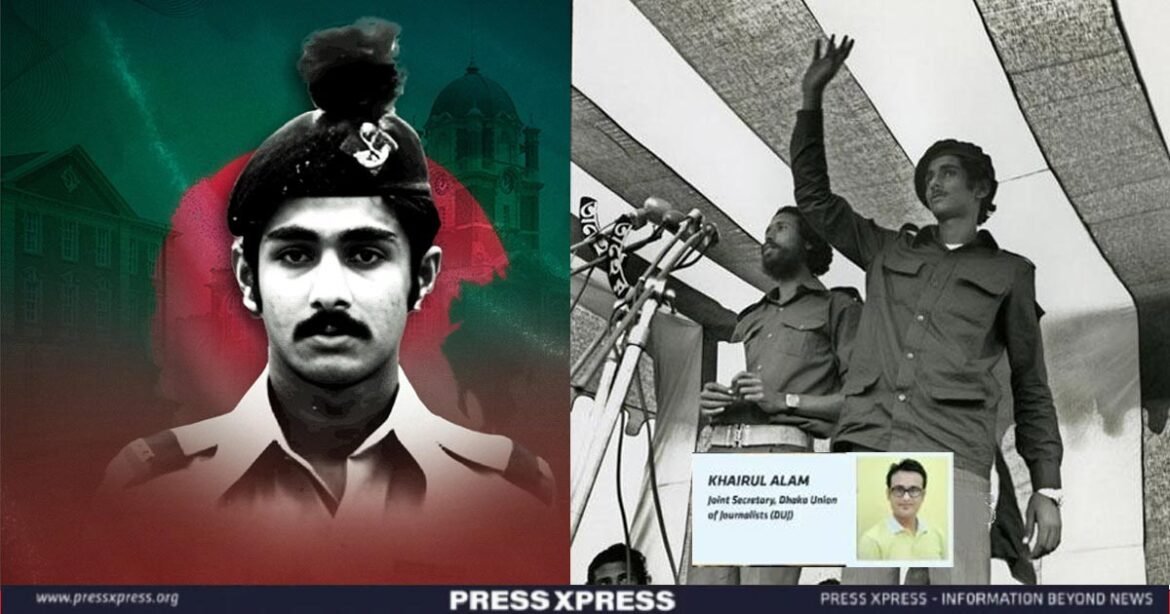In the fleeting moments of life, some leave indelible marks on history, their impact enduring in the transient realm of existence. Such was the life of Sheikh Jamal, the third child of Bangabandhu Sheikh Mujibur Rahman, and the younger brother of the present Prime Minister, Sheikh Hasina.
Today marks the 71st birthday of Sheikh Jamal, the valiant freedom fighter who served in the Bangladesh Armed Forces. Born in 1954 in the hallowed precincts of Tungipara, Gopalganj, to Sheikh Mujibur Rahman and Begum Fazilatunnesa Mujib, his arrival heralded an epochal year in Bangladesh’s political narrative.
You Can Also Read: NOVEMBER 7: INCORPOREAL PRESENCE OF A PAKISTANI GHOST
1954 witnessed a significant chapter in the annals of Bangladeshi political history. It was the year of the Muslim League’s defeat in the elections held in February, and the emergence of the United Front led by the Awami League.
Sheikh Mujib, then a burgeoning leader of the Awami League, rose to prominence alongside luminaries like Hossain Shaheed Suhrawardy and Maulana Abdul Hamid Khan Bhashani. As the political winds swirled, Sheikh Jamal was born into a world where the familial hearth bore the burdens of political upheaval.
Before Sheikh Jamal, the Mujib household had already witnessed the brilliance of Sheikh Hasina and Sheikh Kamal. Sheikh Mujib, nurturing dreams and aspirations for his progenies, instilled a sense of duty towards the nation and its people. Thus, under the nurturing gaze of their mother, Begum Mujib, the children of the Mujib family grew, their lives interwoven with the tapestry of politics and public service.
Sheikh Jamal and his other sibling’s journey began amidst the tumult of his father’s political pursuits and his mother’s tireless efforts to maintain household stability amidst the tempests of politics. While Sheikh Mujib navigated the vast expanse of politics, his spouse, Begum Mujib, shouldered the weight of domestic responsibilities with unwavering resolve.
The children of the Mujib family, therefore, matured in a milieu where duty and service were paramount. From their formative years, they witnessed their mother’s resilience in the face of adversity, her sacrifices shaping their path forward. While their father often found himself incarcerated, the family’s matriarch ensured that the flame of hope never waned.
Sheikh Jamal’s upbringing was imbued with the ethos of sacrifice and service. He witnessed firsthand the struggles of his parents, the trials of political life juxtaposed with the aspirations of an emerging nation. Despite the challenges, Sheikh Jamal and his siblings blossomed into stalwarts of their own right, their journey marked by a commitment to their father’s vision of a prosperous Bangladesh.
In the annals of Bangladesh’s history, Sheikh Jamal remains an emblem of bravery, sacrifice, and unwavering patriotism. His life, though brief, was marked by extraordinary valor and dedication to the cause of liberation.
Sheikh Jamal’s demeanor was starkly different from his elder brother Kamal. While Kamal exuded charm and charisma, Jamal was known for his quiet and reserved nature. However, beneath this calm exterior lay a steely resolve to face any adversity head-on, knowing that it was the crucible in which true greatness is forged.
The political landscape of Bangladesh saw Sheikh Mujibur Rahman, affectionately known as Bangabandhu, emerge as the brightest star in the sky of liberation. But Sheikh Jamal charted his own path, determined to carve out his identity on his terms. On March 26, 1971, as Bangabandhu declared independence in the first moments of dawn, Sheikh Jamal found himself in the custody of Pakistani forces alongside his family. However, what followed was the dawn of the Liberation War, a struggle that Sheikh Jamal was destined to be part of.
One fateful morning in mid-August, his mother Begum Fazilatunnesa Mujib found her son missing from their home. Begum Mujib raised alarm, alleging abduction by the Pakistani authorities. The international community echoed her concerns, with foreign media outlets highlighting Pakistan’s sinister act of making Sheikh Mujib’s son disappear. With the echoes of gunfire reverberating across the land, Sheikh Jamal joined the ranks of freedom fighters, like many other members of the Mujib family.
Jamal’s journey into the folds of the Liberation War began after completing his secondary education at Dhaka Residential Model School and enrolling at Dhaka College. Driven by the spirit of sacrifice, he left the comfort of his home to join the liberation struggle, crossing the border into India through perilous paths.
From Dhaka to Agartala, Sheikh Jamal traversed the dangerous terrain. Here, amidst 80 selected youths of the Mukti Bahini, he underwent rigorous training for 21 days. Upon completing his training, Sheikh Jamal joined Sector 9 of the liberation forces. A photograph captured him with a rifle slung over his shoulder, a testament to his commitment during the tumultuous days of the Liberation War.
However, it was the news of Sheikh Jamal’s involvement in the war that put immense pressure on the newly formed government of Bangladesh. The issue became a matter of intense diplomatic negotiations between the provisional government and the Indian government, as Pakistan vehemently protested.

The Guardian, in its December 2, 1971 edition, published images from the Liberation War, including one featuring Jamal amidst the skirmishes within 10 miles of the border.
When the nation achieved independence, Sheikh Jamal returned to Dhaka from the war front on December 18, 1971. His elder sister Sheikh Hasina, younger sister Sheikh Rehana, and younger brother Sheikh Russell rejoiced with him, reveling in the triumph of freedom.
That very day, Sheikh Jamal attended the first public gathering in Paltan, Dhaka, organized for the freedom fighters. He stood among them, a symbol of resilience and valor.
Sheikh Jamal was drawn to a life of military service, joining the Bangladesh Armed Forces. He was part of the inaugural batch of commissioned officers in the Bangladesh Army.
In January 1974, during a visit by Yugoslav President Marshal Tito, Sheikh Jamal’s exceptional qualities caught the attention of the visiting dignitary. Marshal Tito extended an invitation for Jamal to join the military academy in Yugoslavia.
His marriage to Parveen Rosy on July 17, 1975, marked the beginning of a new chapter, but fate had other plans. Just a month after their wedding, on August 15, the unscaled national tragedy struck as Sheikh Jamal, along with his parents and siblings, fell victim to the brutal massacre at their home in Dhanmondi.
Sheikh Jamal’s life may have been short-lived, but his spirit lives on in the hearts of Bangladeshis. His unwavering commitment to the nation, his courage in the face of adversity, and his sacrifice for the greater good serve as a beacon of inspiration for generations to come.
Today, as Bangladesh commemorates the birth anniversary of Sheikh Jamal, his legacy reverberates through the corridors of history. His life, a testament to the enduring spirit of sacrifice and service, serves as a beacon of inspiration for generations to come. In the annals of Bangladesh’s journey towards progress and prosperity, Sheikh Jamal’s name shines brightly, a guiding light for all who tread the path of nation-building and service to humanity.


